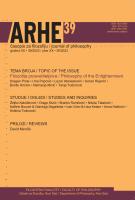Vlast u Farabijevoj utopiji (vrlom gradu)
Authority in Farabi’s Utopia (Virtuous City)
Author(s): Amra HalilovićSubject(s): Political Philosophy, Social Philosophy, Middle-East Philosophy
Published by: Филозофски факултет, Универзитет у Новом Саду
Keywords: Farabi; classical Islamic philosophy; social philosophy; „virtuous city (al-Madina al-Fadhila)“; authority; ruler; virtues;
Summary/Abstract: One of the first and at the same time most important representatives of Islamic philosophical thought, Abu Nasr al-Farabi, who played an extremely important role in connecting the ancient Greek philosophical heritage with the Islamic theological tradition, paid special attention to political and social philosophy. His idea of utopia, i.e. the „virtuous city (al-Madina al-Fadhila)“, caused various reactions among later generations of philosophers and thinkers. Avicenna, Ibn Ṭufayl, and even Shihabuddin Suhrawardi tried to look critically at Farabi’s statements and ideas. Terms and phrases such as political philosophy, social philosophy, politics, government, city, and society in his works are discussed in a very comprehensive manner using a rational method. In this paper, we will focus on the idea of the concept of authority in his utopian understanding of the „virtuous city“. While doing so, we will try to use as much as possible his original works written in Arabic. Methodologically, it is important to note that Farabi’s views on social philosophy are not only important and significant in a philosophical sense, but can also be of use to historians of thought, since Farabi always tried to connect his rational observations at least partially with objective social and political situations during the Abbasid dynasty, the period he lived in.
Journal: Arhe
- Issue Year: 2023
- Issue No: 39
- Page Range: 331-349
- Page Count: 19
- Language: Serbian

